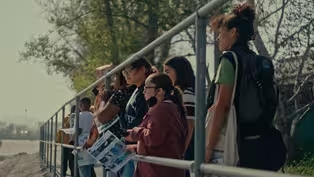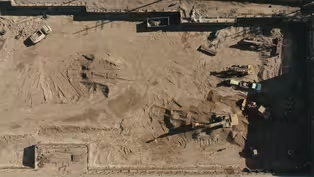
Chinatown's Shift from Affordable to Investment Destination
Clip: Season 5 Episode 2 | 3m 33sVideo has Closed Captions
Chinatown residents wonder if the benefits of L.A. River restoration will pass them by.
Chinatown residents wonder if the benefits of L.A. River restoration will pass them by. Mariela Suarez and her family are watching the community change rapidly from their vantage point in the William Mead Homes community. Sissy Trinh of the Southeast Asian Community Alliance shares how Chinatown and Lincoln Heights are shifting from affordable housing areas to a destinations for major investment.
Problems playing video? | Closed Captioning Feedback
Problems playing video? | Closed Captioning Feedback
Earth Focus is a local public television program presented by PBS SoCal

Chinatown's Shift from Affordable to Investment Destination
Clip: Season 5 Episode 2 | 3m 33sVideo has Closed Captions
Chinatown residents wonder if the benefits of L.A. River restoration will pass them by. Mariela Suarez and her family are watching the community change rapidly from their vantage point in the William Mead Homes community. Sissy Trinh of the Southeast Asian Community Alliance shares how Chinatown and Lincoln Heights are shifting from affordable housing areas to a destinations for major investment.
Problems playing video? | Closed Captioning Feedback
How to Watch Earth Focus
Earth Focus is available to stream on pbs.org and the free PBS App, available on iPhone, Apple TV, Android TV, Android smartphones, Amazon Fire TV, Amazon Fire Tablet, Roku, Samsung Smart TV, and Vizio.
Providing Support for PBS.org
Learn Moreabout PBS online sponsorshipMariela Cruz Suarez: My name is Mariela Cruz Suarez, and I'm 16 years old.
So right now, we are in front of my home, but more specifically in the William Mead community.
So I've lived here since I was in kindergarten, and for reference, I'm now an 11th grader.
Never really thought about how change along the river affected me, but now I think, just thinking a little bit more about it, it's like, you know what?
I do care, and also partly because I've never had access to it.
I think when you take a closer look at it, you see that most of the people that are now coming to live around William Mead are mostly White.
So, for example, the bus drops me off at Chinatown, and from there I walk home, and on my walk home, I do walk by Llewellyn, the big fancy apartment complex.
So anytime my family and I walk by Llewellyn, my mom is just dazzled by the building.
She's just like, "Oh, I hope one day I can live there.
I hope one day I can, like, bring you all guys to, like, live here in, like, a nice building that looks like this."
But in reality, there's so much more that comes with those buildings, like the gentrification.
I think that a lot of people actually don't know that, and I think that's the main reason why they're building those type of buildings here, because nobody's going to fight back, nobody's going to say anything against it, nobody here has the resources to even fight back if they wanted to.
Woman: Chinatown and Lincoln Heights are two of the oldest neighborhoods in the city, and actually, the city was founded right on top of where Chinatown is now.
So Chinatown was created as a containment zone to restrict where low-income Asian immigrants could live.
So we have, like, two of the oldest freeways in the country that are cutting through there.
Our regional prison system and our regional rail, like, both light and heavy rail, so Union Pacific as well as Amtrak.
As a result of all this heavy industrial development, Chinatown and Lincoln Heights are two of the most polluted and environmentally-burdened neighborhoods across the state.
Chinatown was historically a place where not just low-income Asian immigrants went to find housing and jobs, but it was also a place with a lot of affordable housing.
So we do have a significant population of Latino immigrants that live in the neighborhood.
So Chinatown is prime real estate.
For a long time, it wasn't, right?
Everybody was moving out into the suburbs and building new, like, planned communities out there.
And now, you know, you have a generation of millennials who don't want to commute long distances and want to live closer to the city center.
And so you're seeing a lot more investment in downtowns all across the nation.
And so we're seeing a lot of luxury developments coming in.
We're seeing high-end restaurants that are written up by The "New York Times."
You know, David Chang has his restaurant in Chinatown now, and a meal at Majordomo is more than a month's rent for a lot of our tenants.
Mariela: So my mom started her business, Jessica's Produce, and her main motivation for that was because across the street from my elementary school, there was this liquor store, but then it closed down because the rent just got too high.
But after it closed down, my mom was like, "Hey, this is the perfect time for me to start something."
I would say that a majority of the people at William Mead now kind of rely on my mom.
Now there's this new development along the river, so now that all these new people are going to come in and they're going to build their own things.
And I wouldn't be surprised if in a couple years, like, this community just doesn't exist anymore.
Green Gentrification in Elysian Valley
Video has Closed Captions
Clip: S5 Ep2 | 4m 55s | The rebranding of Elysian Valley as a green space is pricing out many longtime residents. (4m 55s)
L.A. River's Legacy of Displacement
Video has Closed Captions
Clip: S5 Ep2 | 47s | For centuries, the L.A. river has shaped life for residents, while also displacing many. (47s)
Transforming the Los Angeles River (Preview)
Video has Closed Captions
Preview: S5 Ep2 | 30s | A transformed L.A. River is envisioned by the communities that live at its edge. (30s)
Unlikely Allies Fight for Affordable Housing Solutions Along the L.A. River
Clip: S5 Ep2 | 3m 8s | Unlikely allies join forces to add affordable housing solutions into the L.A. River Master Plan. (3m 8s)
Providing Support for PBS.org
Learn Moreabout PBS online sponsorshipSupport for PBS provided by:
Earth Focus is a local public television program presented by PBS SoCal



















